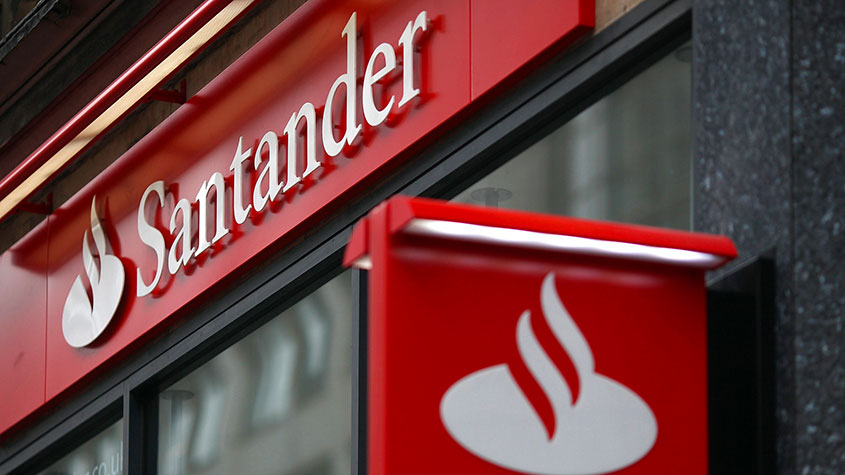Santander launches online pension that offers up to £1,000 cashback
Santander's self-invested personal pension offers customers cashback of up to £1,000 if they invest before 25 April next year. Here is everything you need to know


Get the latest financial news, insights and expert analysis from our award-winning MoneyWeek team, to help you understand what really matters when it comes to your finances.
You are now subscribed
Your newsletter sign-up was successful
Want to add more newsletters?

Twice daily
MoneyWeek
Get the latest financial news, insights and expert analysis from our award-winning MoneyWeek team, to help you understand what really matters when it comes to your finances.

Four times a week
Look After My Bills
Sign up to our free money-saving newsletter, filled with the latest news and expert advice to help you find the best tips and deals for managing your bills. Start saving today!
Santander has launched a self-invested personal pension that offers customers a cashback bonus of up to £1,000 if they invest before 25 April next year.
The high-street bank said the Sipp is designed to give customers greater control over their pension as they save for retirement, with an advice service to follow next year.
A Sipp is a 'do-it-yourself’ pension that enables savers to choose how much they want to pay into their pension with the goal of building up a set amount of income for retirement.
MoneyWeek
Subscribe to MoneyWeek today and get your first six magazine issues absolutely FREE

Sign up to Money Morning
Don't miss the latest investment and personal finances news, market analysis, plus money-saving tips with our free twice-daily newsletter
Don't miss the latest investment and personal finances news, market analysis, plus money-saving tips with our free twice-daily newsletter
Santander says the Sipp will also allow customers to consolidate all of their pensions in one place, with the option to monitor pension performance via a mobile or laptop.
Ashlin Brack, UK head of digital investing at Santander, said: “We want to support our customers through all stages of life, helping them save and invest so they can live life to the fullest; that’s why we have designed our new Sipp to make managing a pension simple and give people greater control over their retirement.”
What are the fees on the Santander self-invested personal pension?
Fees start at 0.35% on balances up to £50,000, 0.2% on balances between £50,001 and £500,000, and 0.1% on balances above £500,001.
These fees are competitive but not the best on the market as low-cost rival Vanguard, for example, has an annual charge of just 0.15% a year, capped at £375 for Sipp accounts.
On top of the administration charge you also need to consider the dealing fees incurred when you buy and sell various investments as well as the charges on the underlying funds in your Sipp.
Santander says pension savers can choose from up to 850 funds to invest in depending on their preferences, as well as four ready-made Santander investment funds for those who prefer their portfolio to be selected by the bank. We have asked Santander what the fees are on those four funds and will update this story when they tell us.
How much is the cashback on the Santander self-invested personal pension?
As part of the launch, the bank is offering a limited-time cashback deal for new pension customers investing before 25 April next year. The cashback will be paid by 1 July 2025.
The cashback offer is tiered and starts at £50 for investments between £5,000 and £9,999, £100 for those investing £10,000 to £24,999, while those saving £25,000 to £49,999 will get £250.
Higher investment tiers include £350 cashback for £50,000 to £74,999, and £500 for £75,000 to £99,999. The maximum payout is £1,000 for investments over £100,000.
Remember, although the cashback offers are enticing, the underlying fees you pay can wipe out those gains very quickly and so the costs of investment should always be compared when opening a Sipp or moving your existing pension to a new provider.
And, again, although the cashback deal offered by Santander looks good it is not the best deal seen touted elsewhere. For example, although the offer is now closed, Moneyfarm was recently giving cashback of £3,000 on transfers of more than £300,000. Nutmeg was also paying £3,000 on transfers of the same amount.
Get the latest financial news, insights and expert analysis from our award-winning MoneyWeek team, to help you understand what really matters when it comes to your finances.
Chris is a freelance journalist, and was previously an editor and correspondent at the Financial Times as well as the business and money editor at The i Newspaper. He is also the author of the Virgin Money Maker, the personal finance guide published by Virgin Books, and has written for the BBC, The Wall Street Journal, The Independent, South China Morning Post, TimeOut, Barron's and The Guardian. He is a graduate in Economics.
-
 Should you buy an active ETF?
Should you buy an active ETF?ETFs are often mischaracterised as passive products, but they can be a convenient way to add active management to your portfolio
-
 Power up your pension before 5 April – easy ways to save before the tax year end
Power up your pension before 5 April – easy ways to save before the tax year endWith the end of the tax year looming, pension savers currently have a window to review and maximise what’s going into their retirement funds – we look at how
